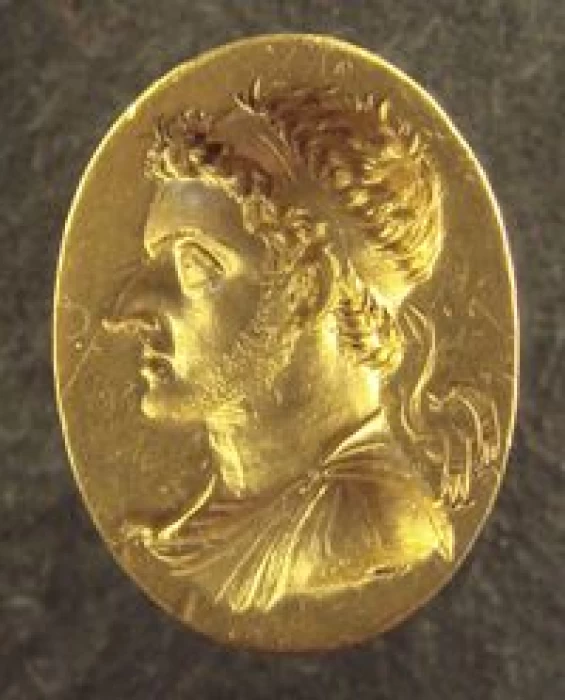
Ptolemy the Sixth
Ptolemy the Sixth
He was born in 186 B.C. and took over his father's position at the age of six in 180 B.C. Following their marriage in 175 B.C., he and his sister Cleopatra II were crowned Philometor Gods.
was declared the king of the throne, the title name Philomator (meaning the lover of his mother), and his sister Cleopatra II and his younger brother Ptolemy VII participated with him in the rule. During his reign, Rome (an ally of Egypt) attacked the ancient kingdom of Macedonia and engaged in a great war with the army of Perseus, the king of the ancient kingdom of Macedonia. The king of Syria preoccupied Rome, which Egypt was under its control, occupied Egypt completely, followed it to his rule, took Ptolemy VI the young captive, and declared himself king over the Nile Valley. Ptolemy VI took power under the tutelage of his mother, Queen Cleopatra the First until 176 BC. M . When the queen's mother died, Ptolemy VI became the only ruler and two of the freed palace slaves took over, namely "Julius" and "Linnaeus". When the king reached the age of fifteen, he married his sister, "Cleopatra II", and crowned himself king in 172 BC. M . He bore the nickname "Philometer", meaning lover of his mother.
Ptolemy VI's foreign policy, and Ptolemy VI assuming the throne, Egypt's foreign policy changed. Cleopatra I was calling for the neutrality of Egypt and appeasement of the Seleucids. Antiochus IV, the king of the Seleucid state, all chances of peace by refusing to continue to pay the income of the sub-region of Syria to the Ptolemies according to what was agreed upon in the friendship of his sister upon her marriage to Ptolemy V, and he completely denied the existence of any treaty that would give the Ptolemies ownership of this region, and on the other hand, Ptolemy V was He hopes to seize Egypt, or at least impose his tutelage on it. Meanwhile, Rome was preparing to fight a new war against the Macedonian state, so it sent an embassy to Philometor and Antiochus IV to check on their position during this war, and the two kings assured the Roman ambassadors that they would keep their loyalty to Rome.
When the war between the Ptolemies and the Seleucids was about to take place, each of the two conflicting parties sent a diplomatic mission to Rome, and Antiochus' envoys to the Senate spoke of challenging the Ptolemies and their principles of aggression. The Ptolemaic envoys were assigned to renew the friendship between Egypt and Rome. These two embassies indicate the extent of Rome's influence in the eastern Mediterranean, and Rome must have used all its political shrewdness in feeding the war between the Ptolemies and the Seleucids to ensure that they weakened together and did not interfere in its war against Macedonia.
Latest Articles
Admin
Seabourn Sojourn Cruise Stops in Safaga Port
The Seabourn Sojourn, the flagship vessel of Seabourn Cruise Line's ultra-luxury fleet, was built in 2008 at the T. Mariotti shipyard in Genoa, Italy. Measuring 198 metres, it can accommodate up to 450 guests in its 225 spacious all-suite staterooms.
Admin
Norwegian Sky Cruise Stops in Safaga Port
Norwegian Cruise Line operates a cruise ship called the Norwegian Sky. It was constructed in 1999 and can accommodate 2,004 passengers in addition to 878 crew members. The ship has several dining establishments, lounges and bars, a spa and fitness center, swimming pools, and a number of entertainment areas.
Admin
Explora II Cruise Stops in Safaga Port
Explora II, the second vessel in the Explora Journeys fleet, sets sail in 2024 to redefine luxury cruising. With 461 ocean-front suites, 9 culinary experiences, and 4 pools, this haven of sophistication and sustainability promises an unforgettable "Ocean State of Mind" journey to inspiring destinations.
Admin
Mein Schiff 6 Cruise Stops in Safaga Port
The Mein Schiff 6 is the latest cruise ship in the renowned TUI Cruises fleet, offering passengers a luxurious and sophisticated cruise experience. At 315 metres long, this floating resort features a range of dining options, entertainment, and recreational facilities, including a spa, fitness centre, and sports amenities.
Admin
Mein Schiff 4 Cruise Stops in Safaga Port
When the Mein Schiff 4 cruise ship docks in Safaga, Egypt, passengers are granted access to a realm of ancient wonders. Aboard this state-of-the-art vessel, guests can embark on meticulously curated shore excursions that showcase the region's most iconic landmarks, including the Giza Pyramids, the enigmatic Sphinx, and the remarkable tombs and temples of the Valley of the Kings in Luxor.
Admin
MS Europa Cruise Stops in Safaga Port
The Silver Moon, Silversea's latest flagship, is a luxury cruise ship that offers an exceptional travel experience for Venezuelans exploring Egypt. With a capacity of 596 guests and an impressive 40,700 gross tonnes, the Silver Moon maintains the small-ship intimacy and spacious all-suite accommodations that are the hallmarks of the Silversea brand.















